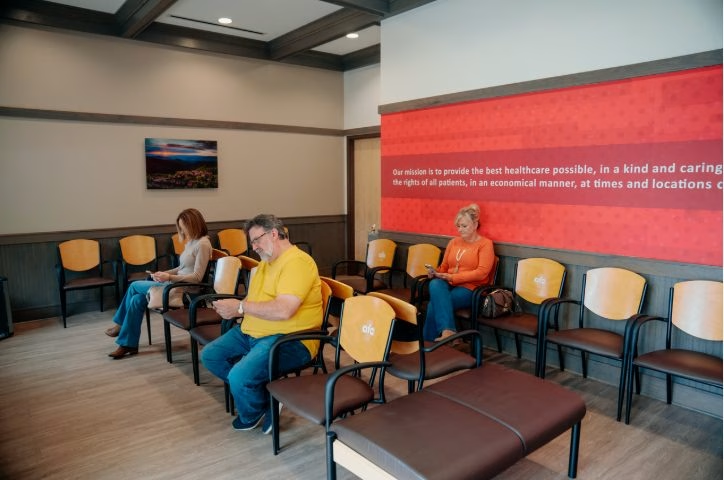
Learn why urgent care wait times vary in Fountain City and how local activities can impact visits. Get practical tips for a faster, stress-free urgent care experience.
You’re in a rush between work and errands. Maybe after picking up your child from Gresham Middle School, your child has a sore throat that won’t quit, or you twisted your ankle heading into the office.
You swing by urgent care, hoping for a quick visit so you can get on with your day. But as you walk in, you notice the waiting room is fuller than expected. The wait feels longer than anticipated. The clock ticks and suddenly, every minute feels like an hour. What’s going on? Why are you waiting?
If you’ve ever wondered, “Why is this taking so long?” you’re not alone.
Urgent care clinics are designed to offer fast, accessible treatment for non-life-threatening illnesses and injuries. But sometimes, wait times are longer than expected, and there are a few key reasons why. In this blog, we’ll explore the common factors that contribute to urgent care wait times and share practical tips to help you make your visit as smooth and stress-free as possible.
Visit AFC Fountain City today.
What Causes Longer Wait Times at Urgent Care?
While urgent care is a convenient option, several behind-the-scenes factors affect how quickly you’ll be seen.
1. Patient Volume
Like many healthcare facilities, urgent care clinics can experience peak times. Weekday evenings, weekends, and holidays often bring in more patients, especially when primary care offices are closed. Patient volume may increase after weekend family outings at Fountain City Park or during local community events near the lake.
Seasonal spikes also play a role. During flu season, allergy season, or in times of increased local activity such as school sports tournaments or community events, patient volume can increase significantly.
2. Case Complexity
Not every visit is a quick fix. Some patients may require diagnostic testing, X-rays, or procedures that take more time. When providers are managing complex cases, it can create a ripple effect that increases wait time for others.
Urgent care still functions as a walk-in model, but patients with more serious symptoms such as chest pain, breathing difficulties, or potential fractures may be prioritized for immediate care.
3. Time of Day and Day of Week
Late afternoons and early evenings are often busier, as people stop by after school or work, finish errands at Kroger, or pick up books from Fountain City Library. Mondays and weekends also tend to be high-traffic days, especially following holidays or weather changes.
How to Make Your Visit Easier
Although you can’t always avoid a wait, there are a few things you can do to help speed up your visit or at least make it feel a little easier.
Use Online Check-In
Most AFC Urgent Care locations offer online check-in, allowing you to reserve your spot ahead of time. This helps you wait comfortably from home or minimize time spent in the clinic.
Avoid Peak Hours
When possible, aim to visit mid-morning or mid-afternoon on weekdays. Early mornings right at opening can also be a good window before patient flow increases.
Bring Essentials
Have your ID, insurance card, and a list of current medications ready. If online forms are available, fill them out before arriving to speed up registration.
Know What Urgent Care Treats
Urgent care is ideal for common illnesses, minor injuries, and non-life-threatening symptoms. If your condition is more serious, such as severe chest pain or head trauma, go to the emergency room instead. Using the right facility helps all patients receive appropriate care faster.
The Bottom Line
Urgent care plays a critical role in helping communities get fast, convenient care, but some delays are inevitable, especially during peak periods or high-volume seasons.
Understanding why wait times happen can help you plan ahead, manage expectations, and reduce frustration. By using online tools and visiting during off-peak hours, you can help make your urgent care visit smoother and more efficient.
AFC Urgent Care is proud to serve Fountain City and surrounding communities in southeast Tennessee. We offer walk-in care 7 days a week. Whether you’re dealing with a sudden illness, minor injury, or just need peace of mind, our team is here to help.